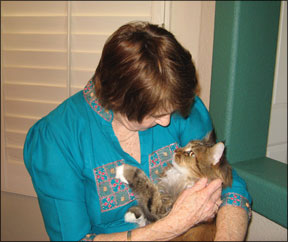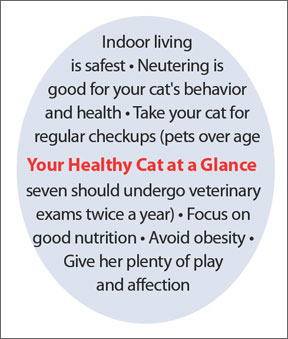You gaze at your adorable feline and wonder: How could you ever live without her? But you know, as a rule, that cats dont live as long as humans. On average, cats live about 14 years. But the good news is that thanks to improved veterinary medicine and owner involvement, cats are living longer and longer, often exceeding the average lifespan by many years.
There are many stories of cats living to their mid or late 20s. There

Bev Caldwell
288
seems to be valid documentation for an unneutered female cat named Spike from the United Kingdom who lived to be 31. Spike’s case was extremely rare, but more stories come out each year about cats living to very ripe old ages.
Could your cat be blessed with an extra long life? While genetics and luck have some influence over a cats lifespan, there are a number of things you can do to increase your cats longevity.
Like purebred dogs, pedigreed cats are often more prone to inherit certain diseases. For example, Persians often suffer from respiratory problems that can affect their longevity and also the quality of their lives. On the other hand, “we see lots of Siamese cats who live long lives,” says Jane Brunt, DVM, of the Cat Hospital At Towson (CHAT) in that suburb of Baltimore, Maryland. “But most of our senior seniors are domestic mixed breeds.”
Prescription for Longevity
If you want to prolong your cats life, you should do the following:
Keep Your Cat Indoors: Indoor felines, if healthy, tend to live about two to three times as long as feral or outdoor cats. “Indoor cats are safer from the hazards of accidents and infectious diseases,” says Dr. Brunt. This is not to say that some outdoor cats dont live a long time, but the majority will succumb to illness

288
and trauma. And living indoors does not guarantee a long life; you have to help your cat live a healthy lifestyle.
Neuter Your Cat: Neutered cats do not seeking mates and are therefore less likely to run off and get themselves into fights with other cats or trouble with other animals, cars and other outdoor dangers. In addition, “Removing the reproductive organs in females eliminates deadly ovarian cancer or uterine infections [pyometra],” says Dr. Brunt. “More importantly, there is a significantly reduced risk of mammary cancer and in middle-aged and older cats if they are spayed prior to their first heat cycle – so the mammary tissue doesnt get sensitized to the reproductive hormones.”
Take Your Cat for Regular Check-ups: Dont wait until something seems wrong with your cat. Regular six-month checkups with periodic lab work and other tests as needed will help your veterinarian uncover problems early and improve your cats longevity. “The first year of a cats life is comparable to 21 years in our lives,” says Dr. Brunt, “and the age of senior cats is four years for every one of ours.” With regular visits, your veterinarian can suggest adjustments to your cats diet or lifestyle.
Prevent Parasites: This is a huge opportunity to keep your cat healthier longer, says Dr. Brunt. In particular, heartworm associated respiratory disease (HARD) is now recognized to be quite different from the canine heartworm disease we recognize in dogs. “Dogs not on heartworm preventative commonly get the mass of spaghetti-like adult worms inside their heart. This occurs occasionally in cats, though with fewer worms,” says Dr. Brunt. New scientific information has shown that heartworm damage in cats is very difficult to recognize and diagnose, and impossible to treat.
A cat with HARD may be coughing or vomiting, or may show no signs at all – or may even suddenly die. “Having your cat on a monthly preventative for heartworm diseases is simple and safe,” says Dr. Brunt. Veterinarians recommend using it year-round to control heartworms and other parasites like fleas, ear mites and intestinal parasites.
Prevent Obesity: While outdoor cats face certain risks, indoor cats face the greater risk of getting too fat. Portion size is important, says Dr. Brunt. Cats will often eat more than they need, and consequently, become “over conditioned,” which is a euphemism for overweight or even downright obese. Obesity can lead to heart disease, type II diabetes and other conditions that can affect your cats lifespan. Obesity also causes cats to become lazy. “Think of all the extra weight fat cats carry,” says Dr. Brunt, “so when they jump, this causes more impact on joints. Arthritis is very common in cats, and is often under-diagnosed, so keep your cat lean.”
Feed the Right Stuff: Sometimes in the news you hear about very old cats that supposedly exist on weird foods – like peanut butter or coffee. If these stories are even true, they represent rare cases.
“Its best to start your kitten on the right path with good, controlled nutrition,” says Dr. Brunt. “These days, we often recommend a combination of canned and dry foods; this helps increase water intake which is beneficial to urinary tract health for the bladder and kidneys.” If your cat has certain diseases or is overweight, your veterinarian will suggest changes to promote his health.
Love Your Cat: Play with your cat, talk to her, cuddle her. This will make your cats life happy – and yours, as well. While theres no hard research that affection and human companionship promote longevity in cats, there is some evidence showing that living with a cat will probably increase your longevity.



